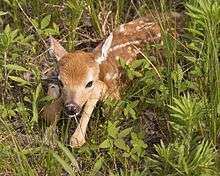Definify.com
Webster 1913 Edition
Fawn
Fawn
(fa̤n)
, Noun.
2.
The young of an animal; a whelp.
[Obs.]
[The tigress] . . . followeth . . . after her
fawns
. Holland.
3.
A fawn color.
Fawn
,Adj.
Of the color of a fawn; fawn-colored.
Fawn
,Verb.
I.
[Cf. F.
faonner
.] To bring forth a fawn.
Fawn
,Verb.
I.
[
imp. & p. p.
Fawned
(fa̤nd)
; p. pr. & vb. n.
Fawning
.] [OE.
fawnen
, fainen
, fagnien
, to rejoice, welcome, flatter, AS. fægnian
to rejoice; akin to Icel. fagna
to rejoice, welcome. See Fain
.] To court favor by low cringing, frisking, etc., as a dog; to flatter meanly; – often followed by
on
or upon
. You showed your teeth like apes, and
fawned
like hounds. Shakespeare
Thou with trembling fear,
Or like a
Or like a
fawning
parasite, obeyest. Milton.
Courtiers who
fawn
on a master while they betray him. Macaulay.
Fawn
,Noun.
A servile cringe or bow; mean flattery; sycophancy.
Shak.
Webster 1828 Edition
Fawn
FAWN
,Noun.
FAWN
,Verb.
I.
FAWN
,Verb.
I.
1.
To court favor, or show attachment to, by frisking about one; as, a dog fawns on his master.2.
To soothe; to flatter meanly; to blandish; to court servilely; to cringe and bow to gain favor; as a fawning favorite or minion.My love, forbear to fawn upon their frowns.
FAWN
,Noun.
Definition 2026
fawn
fawn
English

A fawn.
Noun
fawn (plural fawns)
- A young deer.
- A pale brown colour tinted with yellow, like that of a fawn.
-
fawn colour:
-
- (obsolete) The young of an animal; a whelp.
- Holland
- [The tigress] […] followeth […] after her fawns.
- Holland
Translations
young deer
|
|
colour
|
Adjective
fawn (not comparable)
- Of the fawn colour.
Derived terms
Translations
pertaining to the colour
Verb
fawn (third-person singular simple present fawns, present participle fawning, simple past and past participle fawned)
- (intransitive) To give birth to a fawn.
Etymology 2
From Middle English fawnen, from Old English fahnian, fagnian, fæġnian (“to rejoice, make glad”)[1]. Akin to Old Norse fagna (“to rejoice”)[2]. See also fain.
Verb
fawn (third-person singular simple present fawns, present participle fawning, simple past and past participle fawned)
- (intransitive) To exhibit affection or attempt to please.
- (intransitive) To seek favour by flattery and obsequious behaviour (with on or upon).
- Shakespeare
- You showed your teeth like apes, and fawned like hounds.
- Milton
- Thou with trembling fear, / Or like a fawning parasite, obeyest.
- Macaulay
- courtiers who fawn on a master while they betray him
- 1918, W. B. Maxwell, chapter 2, in The Mirror and the Lamp:
- That the young Mr. Churchills liked—but they did not like him coming round of an evening and drinking weak whisky-and-water while he held forth on railway debentures and corporation loans. Mr. Barrett, however, by fawning and flattery, seemed to be able to make not only Mrs. Churchill but everyone else do what he desired.
- Shakespeare
- (intransitive, of a dog) To wag its tail, to show devotion.
Synonyms
Derived terms
Translations
to exhibit affection
to seek favour by flattery
|
|
to wag tail
See also
- Appendix:Colors
References
- ↑ James A. H. Murray [et al.], editor (1884–1928), “fawn”, in A New English Dictionary on Historical Principles (Oxford English Dictionary), London: Clarendon Press, OCLC 15566697.
- ↑ fawn in Webster’s Revised Unabridged Dictionary, G. & C. Merriam, 1913